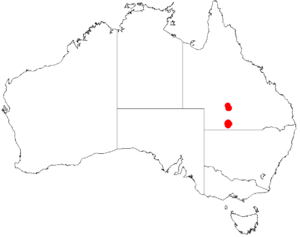Acacia ammophila facts for kids
Quick facts for kids Acacia ammophila |
|
|---|---|
| Conservation status | |
| Scientific classification | |
| Genus: |
Acacia
|
| Species: |
ammophila
|
 |
|
| Occurrence data from AVH | |
| Synonyms | |
|
Racosperma ammophilum (Pedley) Pedley |
|
Acacia ammophila is a special type of tree or shrub. It belongs to the large plant group called Acacia, also known as wattles. This plant is only found in Queensland, Australia.
Contents
What Does Acacia ammophila Look Like?
This plant can grow up to 6 meters (about 20 feet) tall. It has dark grey bark with deep grooves. Its leaves are long and thin, like straps, usually 10 to 20 centimeters (4 to 8 inches) long. They have a silvery, fuzzy covering, especially when they are young.
When it flowers, Acacia ammophila has small, round, golden flower heads. Each head is about 5 millimeters across and contains 25 to 40 tiny flowers. These flowers grow in clusters of 2 to 4. After flowering, the plant produces straight seed pods that can be up to 20 centimeters (8 inches) long. Inside the pods are dull, dark, oblong seeds.
Where Does Acacia ammophila Live?
Acacia ammophila is found only in the southern inland parts of Queensland. You can spot it near towns like Adavale and Thargomindah. It likes to grow on the sides of red sand dunes and in rich, wet soils found near rivers. It usually grows in open areas with other shrubs.
Why Is Acacia ammophila Important?
This plant was first officially described by a scientist named Leslie Pedley in 1978. It's an important part of the natural environment in Queensland.
Is Acacia ammophila in Danger?
Yes, Acacia ammophila is listed as "vulnerable" under Australia's environmental protection laws. This means that its population is decreasing, and it could become endangered if we don't protect it. Protecting its habitat is very important to help this unique plant survive.


